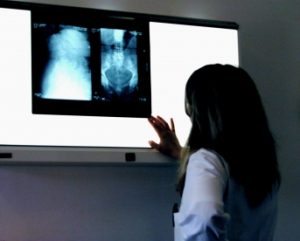The Hidden World Of Doctors With Eating Disorders
 It’s the last person you would suspect to have an eating disorder.
It’s the last person you would suspect to have an eating disorder.
It’s your doctor.
Oddly enough, the last official study done on the prevalence of eating disorders among medical students was conducted in 1985. The results of that study found that about 15 percent of female medical students ages 19-36 had an eating disorder.
More recently, one student’s dissertation research at Midwestern University revealed that the number may be around 13 percent – a statistic that includes both men and women.
Pressures of the job
The subject is taboo in the medical profession. After all, doctors are supposed to be a shining example of health and wellness. But experts claim the pressures of the job and the common thread of an over-achieving personality type puts many doctors at risk for dangerous diseases like anorexia or bulimia.
Dr. Ovidio Bermudez, chief medical officer of the Eating Recovery Center in Denver and past president of the National Eating Disorders Association, explains:
“Of course, there is a lot of individual-to-individual variation, but if I compile all of my experience, I would say physicians are more resistant than others to recognize and come to terms with the idea that they have a serious problem and they need help.”
A problem for students, too
Dr. Jennifer L. Gaudiani, assistant medical director at the ACUTE Center for Eating Disorders at Denver Health, says that medical school students in particular are at a disadvantage when it comes to coping with an eating disorder, as their school environments are often ridden with competition, stress, odd hours and a lack of self-care.
In the same way that other patients are treated for eating disorders, early recognition and full acknowledgement of the problem is the first step toward treatment. Moreover, medical students should be more concerned about their peers, Gaudiani says.
“Doctors can be an unusually unsympathetic group when it comes to colleagues’ illnesses of any kind,” she noted.
Source: OBGYN News
 Eating Disorder Self Test. Take the EAT-26 self test to see if you might have eating disorder symptoms that might require professional evaluation. All answers are confidential.
Eating Disorder Self Test. Take the EAT-26 self test to see if you might have eating disorder symptoms that might require professional evaluation. All answers are confidential.